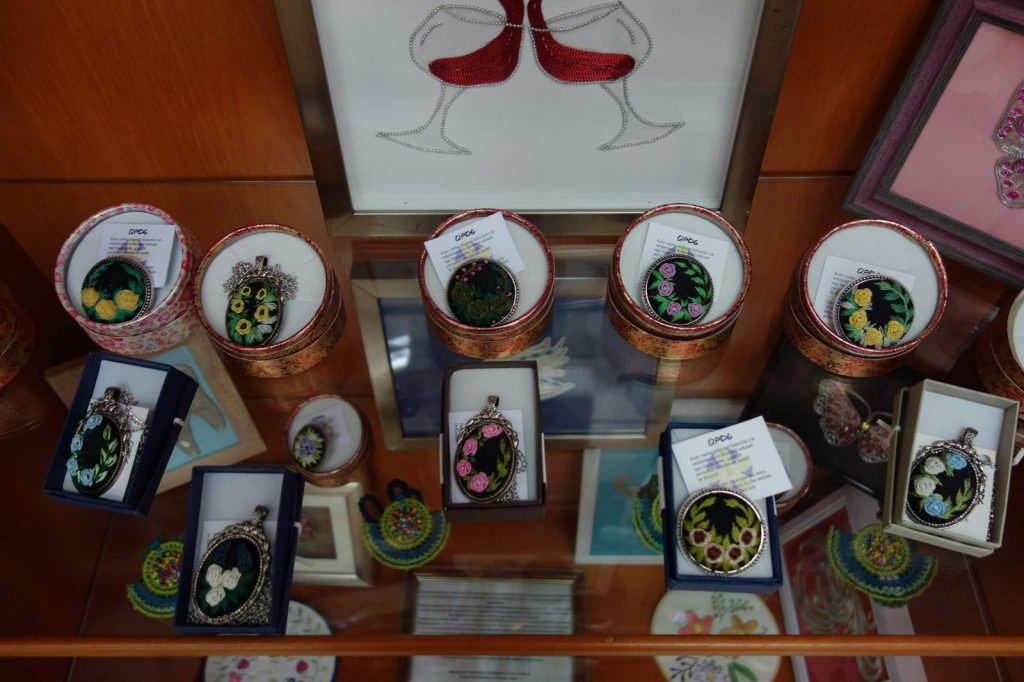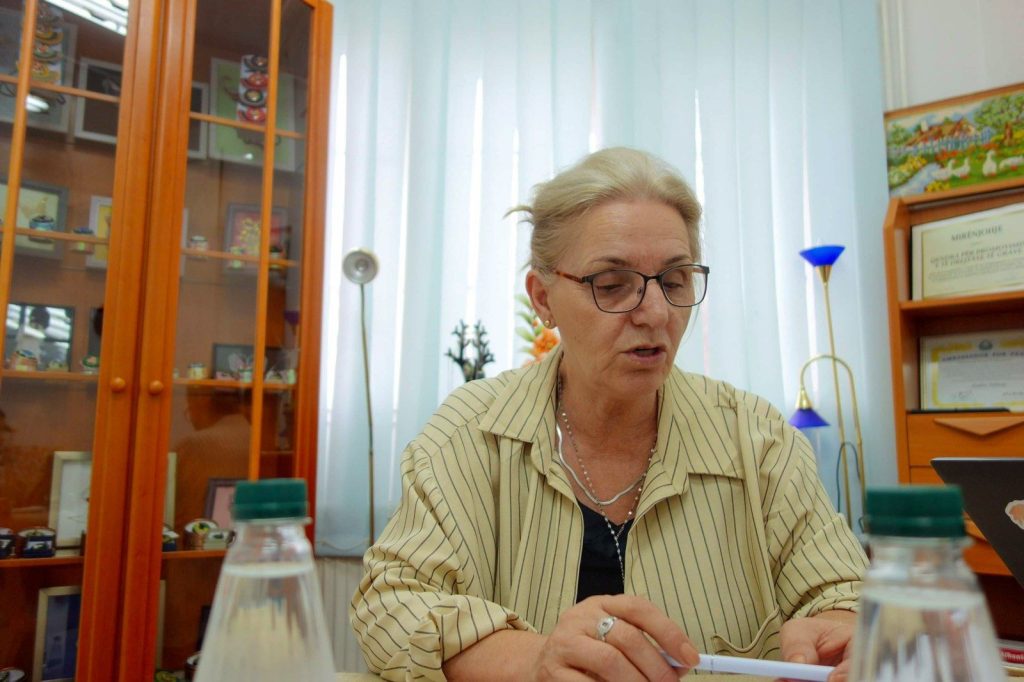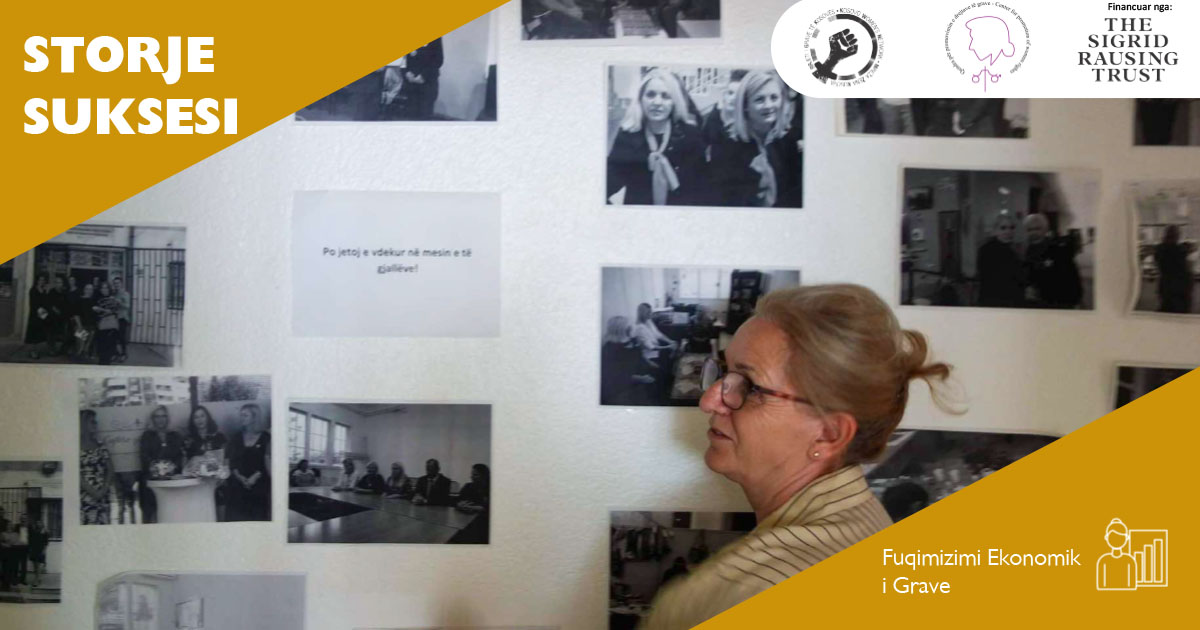“Women refuse to suffer in silence!”
Kadire Tahiraj, CPWR
Different colours and motifs—both floral and traditional—bring life to the space where the ‘Center for the Promotion of Women’s Rights’ (CPWR) is located in Drenas. These works are created by women who survived sexual violence during the recent war in Kosovo, and this centre is where they find peace and solace.
This organization, which now operates openly and enjoys ongoing success, has faced many challenges along the way, as Kadire Tahiraj, Executive Director of CPWR, shares. “They used to refer to my organization as a joke.”
In the early years of her work, from 2003 to 2004, when she began identifying victims of sexual violence, she faced many prejudices, a lack of support, and widespread hesitation.
“When we started, it was very difficult. There were no phones, and we would schedule Tuesdays to go to the Health Center and gather under a mulberry tree.”
Kadire Tahiraj passionately showcases the work they promote within the organization’s space. For these women, CPWR is a place where they feel free, relaxed, and can express themselves openly. CPWR organizes activities aimed at helping these women find peace and supporting their social advancement.
The planned activities for this initiative include conducting silver filigree embroidery training for ten (10) days each month. With the participation of ten (10) women in these trainings, they will learn to create various forms of filigree frames. Additionally, painting workshops will also involve ten (10) women.
The women participating in the painting workshops have begun engaging in these activities, which are held twice a week for two consecutive months. A two-day workshop with Shqipe Malushi is planned in rural areas outside the cities, set in a mountainous region.The works created by the women during the activities will be exhibited at the CPWR premises, in the ‘You can help, too’ store, and in all ‘Corners of Courage’ locations.

CPWR continuously supports 393 women by providing psychosocial services, rehabilitation, assistance in completing applications for status recognition, economic empowerment, and health services.
Through her hard work and dedication to helping women who experienced sexual violence during the recent war in Kosovo, Kadire has significantly contributed to the vital role played by the Kosovo Women’s Network (KWN). “Thanks to the Network, we have identified all the cases,” she says.
Women have sometimes hesitated to speak out and share their experiences, but Kadira’s efforts have fulfilled their need to tell their stories and be heard. “We have used various methods to spread the word that we are supporting victims of the war, primarily by identifying them through women, as these crimes were committed collectively.”. Now, during the recognition of status, the fact that the rapes were carried out in groups, along with the similarities in the women’s testimonies, can sometimes create complications
Recognition of Status: One of the challenges faced by women who experienced sexual violence during the recent war in Kosovo is the process of completing the application for status recognition, particularly the interviewing stage. Until this point, applicants are identified only by code, keeping their identities confidential. However, the Governmental Commission for recognizing and verifying the status of raped persons during the Kosovo Liberation War in Kosovo now interviews all individuals applying for this status. During these interviews, the questions are often too difficult and overwhelming for these individuals to manage, further complicating the process. Kadire calls for a change in this approach to addressing the trauma of the victims, advocating for alternative methods to prove the crimes they suffered.
Currently, there are 26 rejected cases that CPWR is addressing. Often, the testimonies of these women are met with suspicion, with comments like, “”You are just repeating the same words’,” which downplay and question their experiences. This aspect of the status recognition process is particularly distressing for these women.
In addition to supporting women survivors of sexual violence during the war, CPWR also provides assistance to 17 men, offering them the same services.
Ms. Kadire states that many taboos have been broken and social norms have changed in these countries, leading to the removal of numerous prejudices. “With the recognition of status, the innocence of women is upheld; husbands and family members understand that what happened to them was not their fault.”
With the support of KWN, through a small but significant grant, Kadire began her organization’s work and has consistently received assistance from the Network.
Through core support, CPWR has received a grant in the 19th round, funded by the Austrian Development Agency (ADA). This grant has enabled the organization to support women survivors of sexual violence through the project titled “Supporting Women Survivors of Sexual Violence through Health Education”.
The beneficiaries of this project were women who reported experiencing difficult psychological conditions, gynecological health issues, and other chronic diseases—approximately 30 women members of the organization who are survivors of sexual violence. Each month, 10 women participated in relevant activities as part of the project’s implementation.
Among the activities were informative meetings on breast and uterine cancer, as well as gynecological check-ups conducted for several women, which enhanced their ability to manage both their physical and emotional health.
Through this initiative, CPWR supports the KWN Strategy, specifically in advancing gender equality through the rule of law. Additionally, CPWR has once again received organizational support from the Kosovo Women’s Fund, this time planning various artistic activities aimed at providing a relaxing experience for these women.
The planned activities for this initiative include conducting silver filigree embroidery training for ten (10) days each month. The participation of ten (10) women in these sessions will allow them to create various forms of filigree frames. Additionally, painting workshops will also involve ten (10) women.
The women participating in the painting workshops have begun their activities, which are held twice a week for two consecutive months. A two-day workshop with Shqipe Malushi is also planned in a mountainous area outside the cities in question. The artworks created by these women during the activities will be exhibited at CPWR, in the ‘Help and You’ store, and in all ‘Corners of Courage.’
This initiative is supported by the Kosovo Women’s Fund through a grant of €9,840.00, funded by the Sigrid Rausing Trust.








